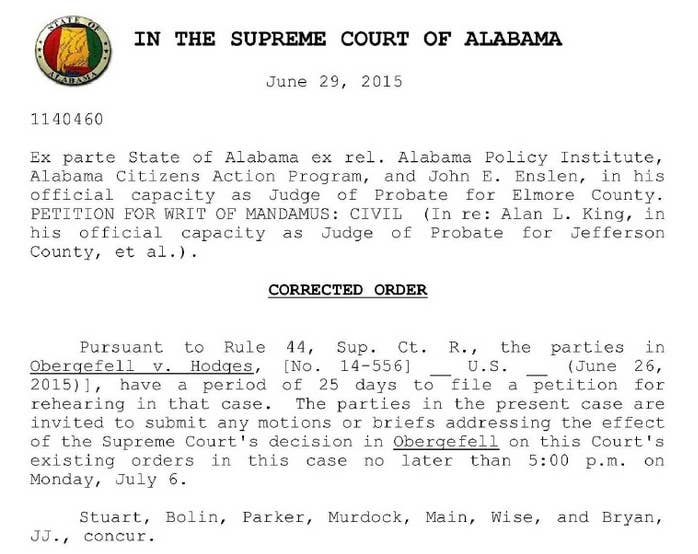WASHINGTON — Three days after the U.S. Supreme Court marriage ruling, there is confusion in Alabama.
First, some same-sex couples were issued marriage licenses in some counties in the state on Monday morning. Then, the state's Supreme Court issued an order in the afternoon and the state's chief justice, Roy Moore, commented on it (despite not being one of the judges issuing the order) — a move that launched confusion, including in the media, about what happens now.
In March, the Alabama Supreme Court ordered probate judges — who can issue marriage licenses in the state — to stop issuing such licenses to same-sex couples. At the time, some probate judges in Alabama had begun issuing the licenses after a federal district court ruled the state's marriage ban was unconstitutional — despite Moore's attempt, as the state courts' administrator, to stop the probate judges from doing so.
Since the state Supreme Court's March order, in which Moore did not participate, there were no marriages for same-sex couples in Alabama. After the U.S. Supreme Court struck down the Kentucky, Michigan, Ohio, and Tennessee marriage bans in Obergefell v. Hodges on Friday — a ruling that creates a national decision on the issue — some probate judges in Alabama began issuing licenses again on Monday.
On Monday afternoon, the Alabama Supreme Court issued an order that asks for input from the parties to the March case as to "the effect of the Supreme Court's decision in Obergefell on this Court's existing orders."
The reference to "existing orders" suggests the court's view is that the March order that banned probate judges from issuing marriage licenses to same-sex couples remains in effect. On Monday, the court did not, however, explicitly direct probate judges to stop issuing marriage licenses to same-sex couples.
Additionally, the Alabama Supreme Court noted that the parties to the Obergefell case have 25 days to ask the Supreme Court to reconsider its ruling — a step that appears unlikely given that state officials in each of the four states have said they will adhere to the ruling.
Although the court did not order probate judges to stop, Moore — despite not participating in the orders in the state case — told AL.com that the Supreme Court's opinion is "[b]asically ... not in effect" during the 25-day period, absent a ruling to the contrary from the Alabama Supreme Court.
Moore's views on the issue, however, are well known. He has spoken out often in opposition to the marriage claims made by same-sex couples. He presumably has recused himself from the case before his court because he had issued his own memorandum, as the administrator of Alabama courts, attempting to stop same-sex couples from marrying in the state in advance of the federal trial court's order there taking effect in February.

In a later update at AL.com, the report stated that Alabama Chief Justice Roy Moore "backtracked" on his earlier statement. From AL.com:
"What the order means is that within that 25-day period no (probate judge) has to issue a marriage license to a same sex couple," Moore said.
Moore said that if he implied that the order prohibited the issuing of marriage license to same-sex couples then he misspoke.
Additionally, the above story was updated to add context regarding Moore's actions.
On Wednesday, U.S. District Court Judge Callie Granade issued a brief order, stating that her prior injunction — which applies to all probate judges across the state — "is now in effect and binding" on them all.
The injunction bars probate judges from denying a marriage license to a couple otherwise qualified for a license solely because they are of the same sex.

